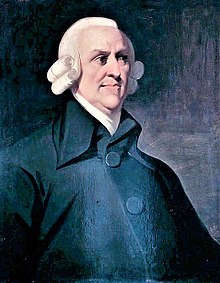Money and the Extent of the Market
An oft-quoted maxim from Adam Smith is “The division of labor is limited by the extent of the market.” Specialization makes us more productive and wealthier as individuals and as a society. The amount we specialize is determined, in part, by how many potential trading partners we have. In a very small group, you cannot afford to specialize too much. Everyone must be good at multiple things. But in a society of millions, or billions, of people, we can focus much more on specific tasks, get very good at them, and then trade with others who do likewise. The result is a virtuous cycle: increased specialization results in increased wealth, which results in increased extent of the market, which results in increased specialization.
Money is a crucial institution that helps us achieve this snowballing process. Money (and specifically a monetary system or standard) is an example of a network good. The more people making use of a given money, the more beneficial it becomes for everyone, both existing users and future potential users. A sound monetary system is a reliable way to increase the extent of the market, and hence take part in the virtuous cycle of economic growth.
One of the reasons the international gold standard was so important was because it provided a de facto common monetary system for the Western economies in the late 19th and early 20th centuries. If countries’ national currencies are all tied to gold, then each country is implicitly on the same monetary standard, governed by the self-regulating mechanisms of robust banking systems domestically and the price-specie-flow mechanism internationally. The international gold standard integrated global markets, reducing the transaction costs associated with international trade. The division of labor could proceed not only on national, but on international lines. The logic of specialization and trade does not stop at national borders. Whether our trading partners are in New York, London, Paris, or Vienna, an increased extent of the market makes it feasible for all of us to specialize more, and hence make each other wealthier.
Ludwig von Mises, Friedrich Hayek, and James Buchanan all preferred to use the word “catallaxy” to describe the continually evolving network of exchange relationships and institutions that exists between individuals. This word is aptly chosen. The word derives from a Greek verb, katallatein, which means “to admit into the community” and “to turn an enemy into a friend.” By extending commercial relationships, we turn abstract Others into concrete partners in a joint venture to make us all better off. Commerce turns potential enemies into actual friends. Money, as the grammar of commerce, is perhaps the most important convention we follow when this transformation is carried out. A cosmopolitan monetary system that operates according to the rule of law, rather than the whims of the powerful, enables us to speak to each other in the language of consent and mutual benefit.
A common monetary system makes cooperation more profitable, and thus conflict more costly. At the margin, this means people will trade more and fight less. This idea is called the doux commerce(“commerce softens”) thesis. Commerce not only makes us better off materially as individuals, but civilizes us as a society. This requires a sound monetary system. Cosmopolitan monetary systems, such as the international gold standard, benefit humanity not just for reasons of material self-interest, but for reasons of virtue as well. A good society is a money-using society, one that respects the implicit contracts associated with the use of money and recognizes the value of integrity in meeting others as equals in the marketplace.
In short, sound money and the progress of civilization are inexorably entwined. Those who would sever this link for the perceived short-run benefits of monetary macro-management and fine-tuning should beware of the harm they court.









